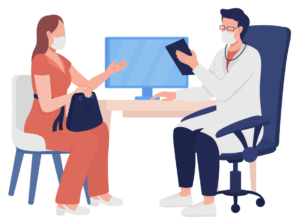
The evidence doctors use to diagnose neuropsychiatric symptoms in lupus – newest results from the INSPIRE study
 December 18th, 2023
December 18th, 2023 Debbie Kinsey
Debbie Kinsey Latest News
Latest News 0 Comments
0 Comments
A new study has found that doctors have a wide variety of opinions on whether different neuropsychiatric symptoms are directly caused by lupus, and how to diagnose them. Doctors rated their assessment as most helpful in diagnosis, and patient reports as least helpful.
What are neuropsychiatric symptoms?
“Neuropsychiatric” (NP) symptoms refers to symptoms that involve the brain, the nervous system, or mental health. That means the term “NP symptoms” covers a wide range, including dizziness, headaches, tremors, anxiety, low mood, hallucinations, and seizures. Fatigue, one of the most commonly reported symptoms of lupus, may also be considered an NP symptom in some cases.
What is the INSPIRE study?
INSPIRE is a project investigating NP symptoms in lupus and similar conditions, comparing the experiences and views of patients and healthcare professionals. There are a series of different studies as part of the INSPIRE project. You can read about INSPIRE’s previous study which investigated how common NP symptoms here: http://lupusuk.org.uk/neuropsychiatric-symptoms-in-systemic-autoimmune-rheumatic-diseases.
LUPUS UK has contributed funding to the INSPIRE project.
What was this study trying to find out?
This study was trying to find out how different doctors diagnose NP symptoms. They also tried to find out how doctors decide whether the NP symptoms are caused by the lupus directly or by something else, like medication side effects or the difficulties of living with a chronic illness. This is called “attribution” of symptoms, and is important because there can be different treatments depending on what is causing the symptoms.
What did this study do?
Doctors were given a list of 13 different ways of assessing NP symptoms, such as brain scans, blood tests, and asking patients if they thought their lupus was flaring. The doctors had to rank their top and bottom three ways of diagnosing NP symptoms.
Doctors and patients were then given a list of NP symptoms and they were asked to rate how much lupus could be the cause of each symptom on a scale of 0 to 100 (the level of “attributability”).
A smaller number of doctors and patients were then interviewed to get more detail about their opinions on diagnosing NP symptoms and how much they could be attributed to lupus.
Different types of doctors (rheumatologists, psychiatrists, and neurologists) were included to see if there were any differences in their answers.
Doctors talked about how there is not enough knowledge about NP symptoms in lupus, so this can make it difficult to decide if the symptoms are caused by the lupus itself or due to other factors. There were a wide range of views on how much a symptom is likely to be caused by lupus and how to describe them. For example, some doctors use the term “CNS lupus” and others “NPSLE”, and some use the same terms but mean different things. This different use of terms could sometimes change whether a doctor thought a symptom was related to lupus or not.
Doctors rated their assessment of how the patient is presenting as the most important way of deciding if NP symptoms were caused by lupus. This was more important than tests like blood tests or brain scans. Doctors said that tests were important to rule out other causes, but many NP symptoms don’t show on tests so they were not very useful.
Doctors rated asking the patient if they thought their lupus was flaring as the least important. There were some differences between how different types of doctors did the ranking, with psychiatrists more likely to rate patient views higher.
Patients rated symptoms as being more likely to be caused directly by their lupus than doctors did. Almost a quarter (24%) of patients thought their view of when their lupus was flaring never or rarely matched their doctor’s view.
What were the conclusions and recommendations?
Doctors had lots of different views on the different ways of assessing NP symptoms and lupus, and on whether NP symptoms can be attributed to the lupus itself. Medical tests, such as brain scans or blood tests, aren’t very helpful for identifying NP symptoms, particularly some types of common symptoms like headaches or brain fog, but were important in ruling out other causes.
Using evidence from interviews, the researchers suggested that if doctors included patient views more in their assessment it may help improve diagnosis and how satisfied patients are with their care. The researchers also suggested that the terminology used needs to change to make it consistent across all doctors, which will also help improve understanding and when working together.
You can read the full scientific article about this study on the journal website here.
What happens next?
In a future study, the researchers are going to test the idea that including patient views in the assessment of NP symptoms and whether they are caused by lupus might help with diagnosis and understanding.
 If you need help
If you need help
It is very common to experience these kinds of symptoms – you are not alone. There are a number of places you can find support.
- Talk to your rheumatologist:
If you are experiencing neuropsychiatric symptoms, talk to your rheumatologist about them. They can assess what the causes may be and refer you for support or treatment if needed. You may find our blog article on getting the most out of your medical appointments helpful in planning what you would like to say and how. If your doctor is not listening to you or believes these symptoms are not common, you can take in a copy of this article or the research paper to show them. - Get mental health support:
The NHS offers different mental health services, such as counselling and helplines. Sometimes you have to be referred by a GP, and sometimes you can refer yourself. You can find what services are available in your local and how to access them on this page on local NHS mental health services. - You need urgent support and need to talk to someone immediately:
If it is an emergency or you are in immediate danger, call 999 or go to A&E. Your mental health is just as important as your physical health and you are not wasting anyone’s time.
If it’s urgent but not an emergency, there are some NHS and charity services you can call:
- Call 111 or go to 111 online
- Find your local NHS England urgent mental health helpline here
- Find your local mental health charity helpline here
- Call a charity mental health helpline. You can find a list on the Mind website here.
- If you need to talk right now, these helplines are free and open at all times:
- Samaritans – 116 123 (UK-wide)
- L.L. – 0800 132 737 (Wales only)
- If you would prefer to text rather than talk, you can text SHOUT – 85258 (UK-wide)




 ©2024 LUPUS UK (Registered charity no. 1200671)
©2024 LUPUS UK (Registered charity no. 1200671)